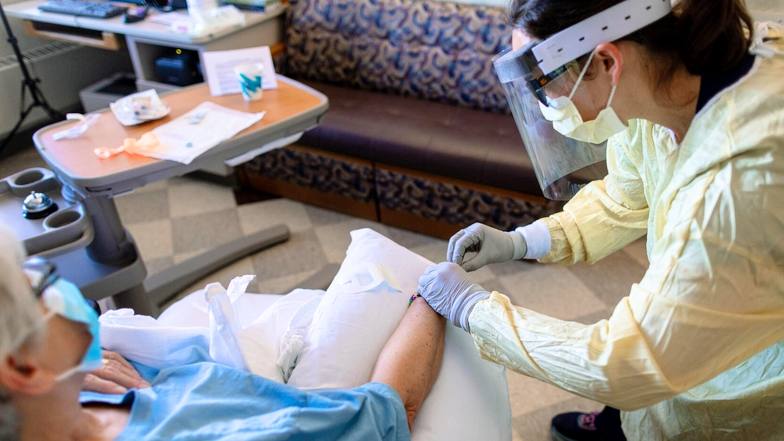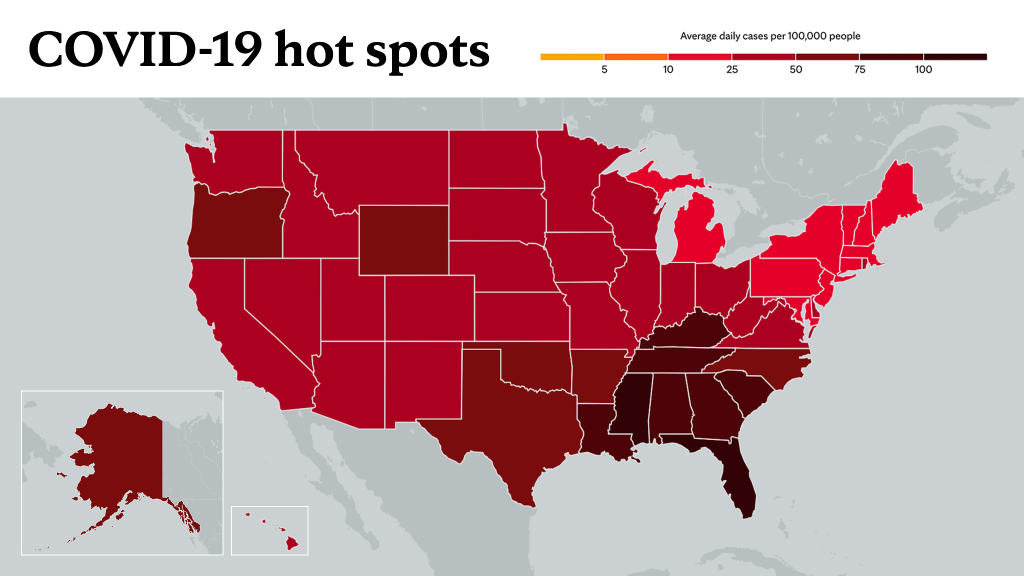
ROCHESTER, Minn. ― In an observational study, Mayo Clinic researchers report that the combination of casirivimab and imdevimab ― two monoclonal antibody treatments under Food and Drug Administration emergency use authorization ― keep high-risk patients out of the hospital when infected with mild to moderate COVID-19. The findings appear in The Lancet's EClinicalMedicine.
Nearly 1,400 Mayo Clinic patients were enrolled in the study ― 696 who received the drug combo between December 2020 and early April and an equal matched cohort who did not receive it. Their status was evaluated at 14, 21 and 28 days after treatment. At each point, the numbers for hospitalization were significantly lower in the treated group.
At Day 14, 1.3% of the treated group was in the hospital, compared to 3.3% of those who had not been treated. At Day 21, only 1.3% treated was hospitalized, compared to 4.2% of those who had not been treated. At the end of 28 days, 1.6% of those treated was hospitalized versus 4.8% of those who had not been treated. This translated to 60%–70% relative reduction in hospitalization among treated patients. Of those who were subsequently hospitalized, the rates of ICU admission and mortality were low.
Watch: Dr. Raymund Razonable discusses monoclonal antibodies helping patients with COVID-19.
Journalists: Broadcast-quality soundbites are available in the downloads at the end of the post. Please “Courtesy: Raymund Razonable, M.D./Infectious Diseases/Mayo Clinic.”
"Once again, this real-world study suggests that when patients who are at high risk due to a range of comorbidities contract a mild or moderate case of COVID-19, this combination of monoclonal injections gives them a chance of a nonhospitalized recovery. In other words, they recover safely at home," says Raymund Razonable, M.D., a Mayo Clinic infectious diseases specialist and senior author of the study.
In a previous Mayo Clinic study published in The Journal of Clinical Investigation findings suggested the use of bamlanivimab reduced hospitalizations in high-risk patients by 40%–60%. That study involved 2,335 treated patients from Mayo Clinic between November of 2020 and February. Comparing their outcomes with 2,335 untreated patients, the ICU admission and mortality rates also were significantly lower with monoclonal antibody treatment. It should be noted that the FDA in April revoked the EUA for bamlanivimab alone and now endorses use of combination monoclonal antibodies.
"Our conclusion overall at this point is that monoclonal antibodies are an important option in treatment to reduce the impact of COVID-19 in high-risk patients," says Dr. Razonable.
This study was funded and conducted by Mayo Clinic in collaboration with Nference Inc.
Journalists: Broadcast-quality b-roll of the Mayo Clinic Infusion Center is in the downloads at the end of the post. Please courtesy: "Mayo Clinic Infusion Center / Mayo Clinic News Network."
###
About Mayo Clinic
Mayo Clinic is a nonprofit organization committed to innovation in clinical practice, education and research, and providing compassion, expertise and answers to everyone who needs healing. Visit the Mayo Clinic News Network for additional Mayo Clinic news. For information on COVID-19, including Mayo Clinic's Coronavirus Map tracking tool, which has 14-day forecasting on COVID-19 trends, visit the Mayo Clinic COVID-19 Resource Center.
Media contact:
- Bob Nellis, Mayo Clinic Public Affairs, newsbureau@mayo.edu
Related posts:
- Monoclonal antibody therapy for COVID-19 safe for transplant patients
- Monoclonal antibodies: Update on this COVID-19 experimental therapy
- Monoclonal antibodies help COVID-19 patients avoid hospitalization
___________________________________
For the safety of its patients, staff and visitors, Mayo Clinic has strict masking policies in place. Anyone shown without a mask was either recorded prior to COVID-19 or recorded in a nonpatient care area where social distancing and other safety protocols were followed.
Information in this post was accurate at the time of its posting. Due to the fluid nature of the COVID-19 pandemic, scientific understanding, along with guidelines and recommendations, may have changed since the original publication date.
For more information and all your COVID-19 coverage, go to the Mayo Clinic News Network and mayoclinic.org.
Learn more about tracking COVID-19 and COVID-19 trends.








